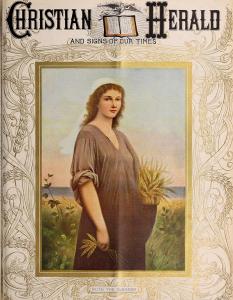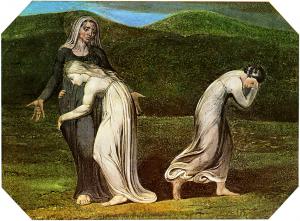 I have written several times concerning the astonishing book of Ruth, how I gave it little thought after my first serious brush with it in my graduate work, how I did not use it in my preaching ministry for many years, how Phyllis Trible schooled my masculine eyes to view it as the potent statement it is. She taught me that it is decidedly not a story about a romance between Ruth and Boaz, generating the line of Israelites that eventually produced the great King David. It is instead a tale about the amazing love and devotion that Ruth demonstrated for her mother-in-law, Naomi, a love that transcended age and nationality, indifference and cultural custom. In short, Ruth displays in her every action a commitment and a loyalty to Naomi that mirrors the central characteristic of YHWH, namely YHWH’s chesed, that Hebrew word for unbreakable, unstoppable love for all of humanity. Ruth in this story becomes nothing less than a model for the way that human beings should act when confronting their fellow inhabitants of the planet. Ruth, the foreign woman, can serve us as a mirror for our very best selves.
I have written several times concerning the astonishing book of Ruth, how I gave it little thought after my first serious brush with it in my graduate work, how I did not use it in my preaching ministry for many years, how Phyllis Trible schooled my masculine eyes to view it as the potent statement it is. She taught me that it is decidedly not a story about a romance between Ruth and Boaz, generating the line of Israelites that eventually produced the great King David. It is instead a tale about the amazing love and devotion that Ruth demonstrated for her mother-in-law, Naomi, a love that transcended age and nationality, indifference and cultural custom. In short, Ruth displays in her every action a commitment and a loyalty to Naomi that mirrors the central characteristic of YHWH, namely YHWH’s chesed, that Hebrew word for unbreakable, unstoppable love for all of humanity. Ruth in this story becomes nothing less than a model for the way that human beings should act when confronting their fellow inhabitants of the planet. Ruth, the foreign woman, can serve us as a mirror for our very best selves.
The storyteller presents this paragon to us in multiple ways in the very first chapter of the tale. Naomi has been forced by a persistent famine in Israel (though she ironically lives in a town, Bethlehem, that means “house of food”) to emigrate to another country, Moab, a place just across the terrible Dead Sea, but also a place much higher in elevation and thus prone to more consistent rains. While living in this new land, multifarious tragedies strike. First, Naomi’s husband, Elimelech, dies. Several years pass, and her two sons, Mahlon and Chilion, marry local girls, Orpah and Ruth. But then, both of her sons die, and she is left with two foreign daughters-in-law. Yet, much worse than that is that her family now consists only of three widows, a difficult reality in a patriarchal world. Without men to anchor them to the ancient society, Naomi, Orpah, and Ruth are in effect wards of the society, women with few rights and limited hopes for the future.
Naomi soon hears that the famine has ended in her homeland, and she decides to return home. After all, what hope has she in this alien Moab, as both foreigner and widow? Surprisingly, her daughters-in-law determine to go to Israel with her. But Naomi will have none of that! She questions their desire to stay with her, claiming there is no real hope for them in her homeland, and finally lying that she has no relatives there who might marry them (we will learn that this is plainly untrue!) and thus fulfill the custom of the Levirate marriage as outlined in Deuteronomy 25:5-10. She even goes so far as to portray an absurd scenario where a strange man meets her “this very night,” they marry and produce sons. She then asks the two women if they would wait until these babies have grown up and then marry them to fulfill the custom? Well, hardly! They would both be too long in the tooth for such ridiculously delayed marriage partners. It is beyond plain that Naomi wants nothing to do with these foreign women, and Orpah gets her point and heads back to Moab. “But Ruth clung to her,” reads 1:15. The verb used is a famous one. In Gen.2:24 it is this verb that describes the very reason why men leave fathers and mothers and “cling” to wives, thus becoming one flesh. It is also this verb that denotes Solomon’s deep devotion to his many foreign wives, despite the warning of the author that such “clinging” will inevitably lead to a bad and pagan end (1 Kings 11:1-2). Ruth’s clinging to her mother-in-law, the woman who has just made it clear that she wants nothing to do with Ruth, is especially surprising. What can Ruth possibly gain from such devotion to Naomi?
And, of course, Ruth’s astounding speech that ensues at 1:16-17 has become justly famous, but I fear mostly for the wrong reasons. It has been set numerous times in music and has regularly been used in wedding ceremonies as a sign of the couple’s unwillingness ever to leave one another again. That is surely the upshot of Ruth’s Bethlehem road speech, but its power has been thus overly romanticized and thus too often trivialized, drenched in wedded, romantic bliss. In fact, the speech is nothing less than one of history’s most staggering proclamations. This is so due to the context that is often overlooked and undervalued.
Ruth and Orpah have just been dismissed by Naomi’s sharp and prevaricating words. Their mother-in-law has used every verbal trick she knows to get rid of these women, not excluding a flat-out lie about her supposed lack of eligible relatives. Her dexterous words work their way with Orpah, but not Ruth. Ruth’s devotion to Naomi cannot be swayed by any speeches, no matter how clever. Ruth in the face of Naomi’s evident plan to go on alone, says this:
“Do not force me to abandon you or to turn back from following you! Where you go, I will go;
Where you live, I will live. Your people will be mine; Your God mine.
Where you die, I will die and be buried.
May YHWH do whatever to me, and even more, if even death separates us!”
There is a patriarchal mouth full! Ruth pronounces to Naomi that she will stay with her in this life, and that even after this life has ended she will die with her and be buried with her. Absolutely nothing with separate the two of them ever again! And in the subsequent scenes of the drama Ruth proves as good as her word; in all things she thinks first of Naomi, risking her life and personal reputation in a foreign field, risking her moral reputation with a man she hardly knows on the threshing floor at midnight, all the while thinking only of Naomi’s welfare and future. At the end, the women of the community announce what the story has revealed that Ruth is “more than seven sons” due to her “love” for Naomi (4:15). That is the only time in the tale that the word “love” is used.
We live in a day when such a model of human devotion is desperately needed, when such selfless love is in short supply. I write in the midst of a terrible week in America, when a white man goes into a store and murders too innocent African- American people just because they are persons of dark skin, when 13 pipe bombs are sent to persons, two of them former presidents, who disagree with the words and actions of the current occupant of the White House, and when an anti-Semitic monster enters a house of prayer and murders 11 Jews, one of whom survived the Holocaust in Germany only to be gunned down in her adopted country. We need to look to Ruth, the foreign widow to show us how to love, even those who would reject such love, even those who appear to be unlovable. May Ruth love among us and in us as we seek to become the people we were created by God to be.
(Images from Wikimedia Commons)











